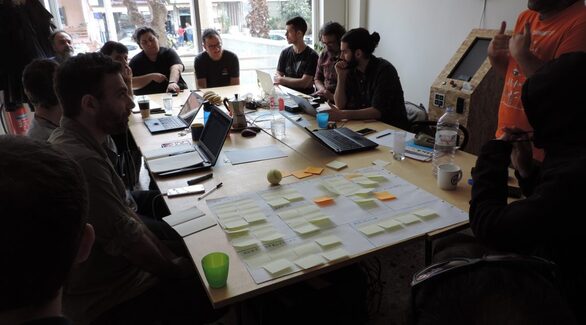|
By Christos Giovanopoulos,
infra-demos member & PhD candidate in Anthropology, Vrije Universiteit Amsterdam The latest version of CommonsFest in Heraklion, Crete (Greece) took place on the weekend of 30 & 31 March and 1 April. infra-demos took active part in the organization and funding of the festival. CommonsFest has been an annual action to promote open source knowledge and P2P cooperation for the development and management of the commons that runs since 2013.This year the three-day event focused on the creation of common(s) structures for the advancement and support of sustainable cooperative schemes and enterprises. The meeting aimed to detect and display the potentialities of the cooperative model of work as a viable form of professional enterprise. One that combines the inclusion of everyone in the labor market without exclusions while it develops a model of democratic self-management and producers’ autosuggestion. A diverse eco-system More than twenty-two collectives active on the field of cooperative and solidarity economy and the commons throughout Greece presented their work (full programme) manifesting a vibrant and advancing activity in a wide range of fields, from digital technology to agriculture. Cooperative schemes such as Ο.Σ.Η. (Integral Cooperative of Heraklion), Terra Verde and Fruits of Solidarity presented their work on developing unmediated (producer to consumer) networks of food distribution, both on a local and on cross-national levels. C-Hub Athens and common/space presented their efforts to address issues as housing and the production of urban infrastructures and space as commons and through participatory practices, while the Elektra Energy cooperative spoke of their work on assisting the creation of energy (users’) communities. In addition the, pioneering and well known, Sarantaporo.gr updated on their autonomous wireless communication network (going since 2013) that brought internet connection to the residents of 11 isolated from the grid villages in the mountainous Sarantaporo area of Elassona (central Greece). One also has to underline the presence of Εφημερίδα των Συντακτών (Newpaper of its Writers), the only cooperative daily paper in Greece with national distribution, which runs since 2012. Of course, in such a meeting significant it was the presence of numerous tech-cooperatives and hacker communities in Greece. Collectives which have been in the frontline of promoting and producing open source tools for more than a decade, and younger ones’ created in the period of the crisis. The makerspace Commonslab has been one of the initiators and hosts of CommonsFest in Heraklion where it is based. Hackerspace has been another significant community in open source technologies in Greece and internationally, which participated along with other cooperatives such as the open.tech, foss.office, Στην πρίζα (translates “in the socket”) and Sociality. Last but not least a variety of research projects related with the development of digital open source and participatory infrastructures complete the picture of the participants. Infra-demos was one of those projects next to the internationally established P2P Lab, to Newcastle university related Open-Lab Athens and to the Zurich based non-profit research group NetHood. Results CommonsFest by bringing together practitioners, activists, researchers and communities on the fields of open source technologies, cooperativism, solidarity economy and the commons, managed for one more year to become a creative and inspiring hub. However, this year the occurring knowledge exchange and collaborative atmosphere had some tangible results. In the framework of CommonsFest a parallel process for the creation of a Collaboration for Open Technologies took place, with the participation of 9 collectives, Infra-demos among them. The outcome has been a first public statement regarding the will and objectives of this ongoing process. Those are discerned in two pillars. The first relates to the development of a collaborative network among tech-cooperatives in order a. to upgrade their operational capacities aiming to enhance their sustainability and b. to develop and promote more efficiently open source and collaborative mode of technologies among the social solidarity economy entities. The second regards the creation of research actions and collaborations for the advance of the urban movements, cooperative forms of economy and (practices and infrastructures of) the commons. The entire process manifests the potential for the emergence of participatory and collaborative modes of techno-social infrastructures which infra-demos tries to bring to light. Moreover, by being organic part of these developments infra-demos practices from the outset an engaged and participatory research methodology, as a constituent element for/of the design of open to citizens and communities (needs and skills) infrastructuring and infrastructural transformation.
4 Comments
|
Authorinfra-demos Archives
January 2022
Categories |

 RSS Feed
RSS Feed